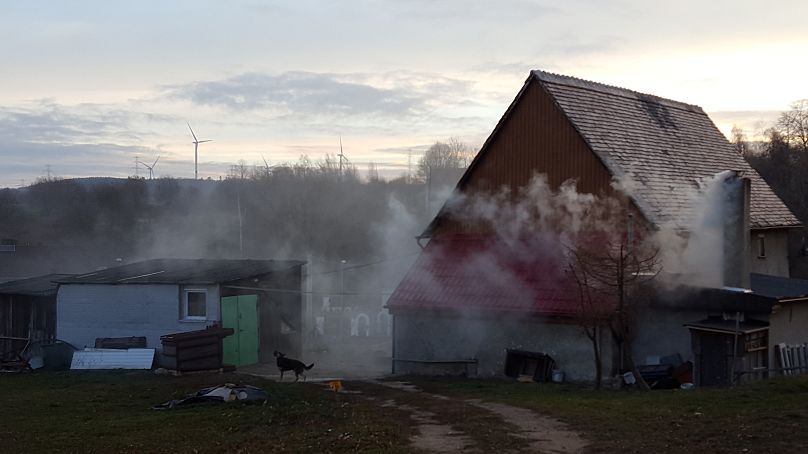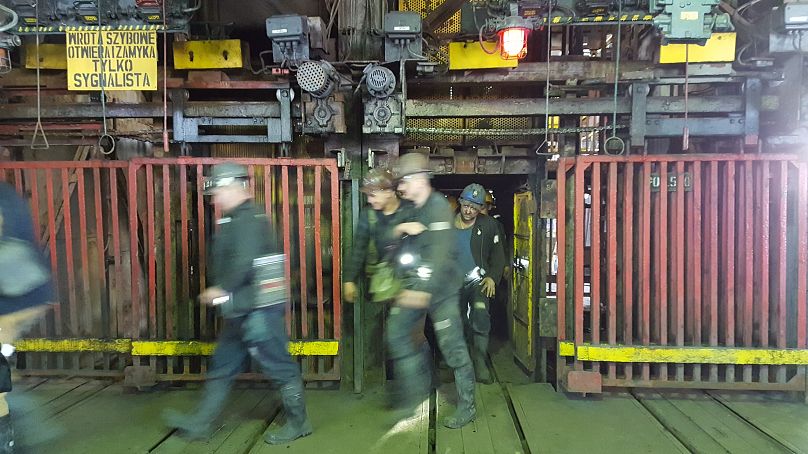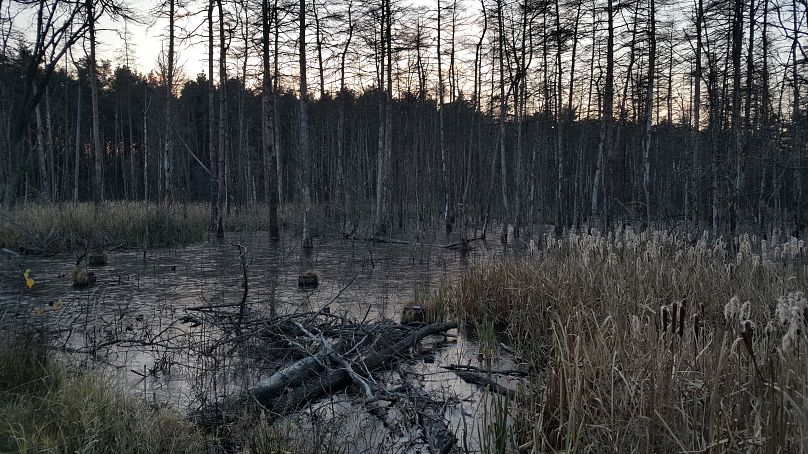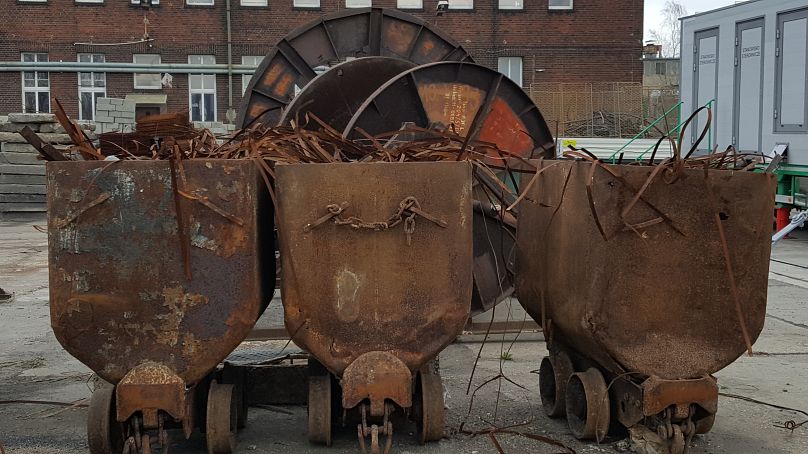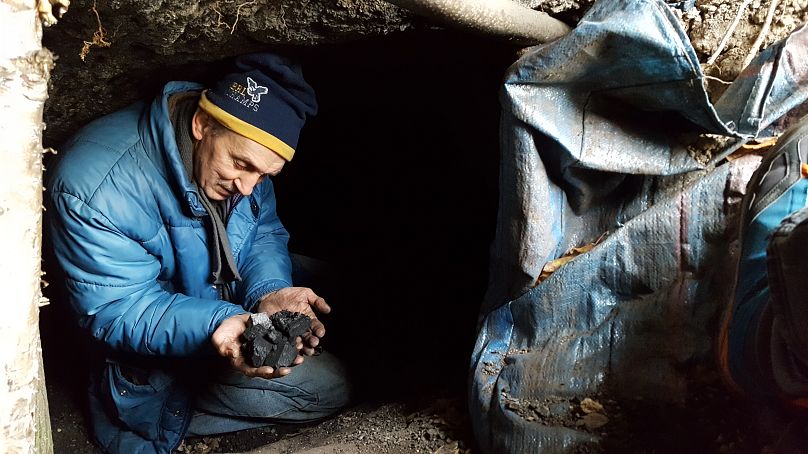Host of the #Cop24 Poland heavily depends on coal and tops the list of Europ's most polluting and CO2 emitting countries. Insiders takes you on a journey from the Czech Republic to the heart of Silesia, Poland's realm of coal, to hear from those to whom coal is either a lifeline or a plague.
Host of the #Cop24 climate summit, Poland heavily depends on coal and tops the list of Europ's most polluting and CO2 emitting countries. In this edition of Insiders, euronews reporter Valérie Gauriat takes you on a journey from the Czech Republic to the heart of Silesia, Poland's realm of coal, to hear from those to whom coal is either a lifeline or a plague.
Nestled in the Liberec Valley, in the Czech Republic, stands the picturesque village of Vítkov.
Life seems more than peaceful, for its hundred or so inhabitants.
But for some time, anxiety has prevailed ..
Marie Pilařová, the former head of Vítkov kindergarden, shows us the creek that trickles under the bridge leading to the school, in the upper part of the village.
"Before there was about a meter of water here, but in the last year the water level has dropped a lot and this stream has almost completely dried up.", she says
Fingers point to global warming, but also, to the Polish lignite mine of Turów, on the other side of the border.
Its huge water consumption threatens the groundwater of the whole region, fear the inhabitants of Vítkov.
As here at the kindergarden, they had to dig deeper and deeper wells to get drinking water.
"The problem is that not everyone can afford to fund new wells, and if people don't have water, they will leave, and the area will die.", comments Karel Řehák, a teacher accompanying us.
We head to Bogatynia, in western Poland, the adjacent town to the Turów mine and its thermal power plant.
The city owes its prosperity to coal.
But that comes at a price ..
The Turów plant is ranked among the 5 most CO2-generating and also most polluting coal-fired plants in Europe.
We visit a neighbourhood set right at the foot of the Turów plant's chimneys.
We have an appointment with one of the inhabitants.
Like many in Bogatynia, he works in the energy sector, and does not want to be recognized.
"The extraction and burning of coal, cause many health problems, especially because of the coal dust and fine particles that smother us. Emission standards are regularly exceeded." he tells us.
"We can feel it in our mouths, in our eyes, in our noses, we see it on everything around us. "
Clouds of black fumes fill the screen of his PDA as he shows us a video he took of loading and storage of coal outside the plant, right next to his neighbourhood. He then shows us pictures he took of the snow outside his house last winter. The snow is actually black.
He then invites Valérie Gauriat to follow him on the terrace.
"That's what it looks like; it's a day after we've cleaned up." he says, swiping the table: his fingers are covered in a thick layer of coal dust.
The European Court of Justice has slammed Poland for the poor quality of its air.
In addition to the mining industry, the use of coal for heating and cooking in 40 percent of households is a major source of pollution.
In Katowice, capital of Silesia, and host of the recent World Climate Summit, we meet up with a group of climate activists handing out anti-smog masks to passersby. The want to raise public awareness.
According to the European Environment Agency, pollution kills some 50,000 people a year in the country.
"From 50 most polluted cities in the EU, 33 are located in Poland" says Patryk Bialas, a climate activist and renewable energy specialist. "And coal is one of the reasons of global warming. That's why we need to phase out coal."
Phasing out coal is a challenge, in Silesia, long called the Polish kingdom of coal.
The industry represents some 85,000 direct jobs, and generates 4 times more indirect jobs.
The Piast coal mine, not far from Katowice, is the largest in Europe.
We are allowed in, a few days before the Cop 24.
"It was a real challenge to get all the way here" explains Valérie Gauriat. "Mining companies are very reluctant before the summit to see the media. They're afraid of bad publicity."
It's the end of the working day for the men we see rushing out of the lifts that take them back to the surface from the depths of the mine pits.They spent seven hours underground, 500 and 600 meters deep.
We meet Radosław Wojnar, one of the 3500 workers at the Piast mine. At 29, he's soon to start his ninth year here.
The job is trying, and dangerous, he says. But he could not think of doing anything else.
"I have seen this mine from my window my entire life" smiles Radosław , his face still covered in charcoal dust. "My father was a miner, my grandfathers worked in the mines. This is a tradition transmitted from generation to generation. This is a tradition transmitted from generation to generation. Sometimes I feel like a human wreck, my spine hurts, my knees hurt, my legs hurt. But that's the nature of the job. It’s hard to explain why, but something draws me to it, and I keep working in this mine.”
After work, the young coal miner often meets up with his friend and neighbour Dominik. We follow him to his flat. They share a passion for ski and surf. Together, they started a blog dedicated to the mountains and winter sports.
"If I have to spend my time working in narrow tunnels and in the dark, then my reward is spending my free time in open spaces, in the mountains and on the summits." says Radosław , who is also a photographer. For years, he has immortalized the reality of miners.
"I feel it's my duty, because I live here and work in this mine, to cultivate this mining tradition, to show it and support it, so it will never be forgotten."
The fight against global warming is also their business, say the two friends.
But it can not be done to the detriment of the community in which they grew up, insists Dominik, who launched a communications agency called "Creative mine".
"This simplistic assimilation of those who risk their lives to extract coal, to global warming,, for me is social racism, and that is unacceptable." he says.
"I think we should change our energy mix in the long run, reducing the share of coal, but it must be a well-planned process."
The end of the coal, which accounts for more than 80 percent of the country's electricity, is a distant prospect in Poland.
In addition to the construction of a new coal plant in the north of the country, several mining sites plan to extend their perimeter in Silesia.
New plans for the extension of the nearby Piast mine, under the town of Imielin, are worrying residents.
Former chair of the Imielin council, and member of a pro-climate citizens' collective "Citizen's Beyond coal", Tomasz Lamik wants to show us the damage already caused by the existing mine, in another village nearby.
"Because of land subsidence, the buildings are leaning, the houses are cracking, in some cases they even had to be demolished.", he explains, showing us a huge crack in the outside wall of a house whichhad to be abandonned by its inhabitants.
"Here there has been intensive mining activity for 30 years; they fix the buildings, they get damaged again, they fix them again, they're damaged again, and so on." adds Tomasz, before showing us a pond of stagnant water flooding the nearby woods. "The water accumulates and the mine does not pump it.This forest is dying because it is under water."
At the entrance of Imielin, the railroad tracks collapsed with the terrain slump. Alicja Zdziechiewicz meet us there. A teacher, she also wants to save her town.
"This railroad is for me the symbol of one side of what our city is now, it is pretty and neat; and on the other, it shows what can happen to us" she comments, pointing to the railtracks. Our homes can collapse, as well as both our drinking water tanks. "
In the long run, Tomasz and Alicja fear to see their city depopulate.
They take us to a house in Imielin, where Bartosz Tarkowski and his neighbor Anna Drobik are waiting for us. Their neighborhood is far from the mining perimeter. They thought they were safe. Wrongly.
"There are big cracks", says Bartosz, pointing to a wall up the house staircase. "The door frame has also sagged. And down there, there is another big crack, . And this wall is completely split. My first shock, I remember as if it were today. It may have been our third or fourth night in this house. When the house shook, I jumped off my bed and then I couldn't go back to sleep. "It happened even recently, there was a huge tremor. "
"Yes it was on the 20th of October", remembers Alicja.
"It was over 3 degrees on the Richter scale" adds Anna. "Items in the cupboards were overturned, the cupboards dors opened, the drawers came out, we had to hold on to the TV so it wouldn't fall! We have no reinforcement structures in our houses, we are sure that if the mine starts extraction here, 180 meters deep, as they wrote, then our houses will just disappear. "
Tomasz concludes: "I'm counting on the help of the European Union, whose climate policies plans to reduce the exploitation of coal".
The carbon neutrality advocated by the European Commission by 2050 is unthinkable, in the eyes of the Polish authorities and the mining industry. Too fast a transition would be fatal, says the regional head of the Solidarność trade union in Silesia, for which the green economy can not offset the job losses related to the coal industry.
"Twenty-five years ago, when the restructuring process began, we lost thousands of jobs, and only hundreds of jobs were created in exchange." he explains. "If the acceleration of the decarbonisation process continues to be as strong as the European Union wishes, we would not withstand it either economically or socially. And anyway, we will continue to buy products with a carbon footprint, coming from countries that do not care about climate, or reducing greenhouse gas emissions, like China, India, the United States, and so on. And we will lose competitiveness in the European Union. "
Traces of the deep restructuring of the coal sector in Poland are still visible. Abandonned mine shafts fill the landscape. While part of the mining basin has succeed in its economic transition, some regions are still struggling.
In Lower Silesia, in the southwest of the country, the region of Walbrzych has long thrived on coal. Deemed unprofitable, all the mines here were closed down in the eighties and nineties, leaving tens of thousands of people out of work.
Many here have never accepted what they consider above all as an unjustified political decision. Like this former miner, we came across in the street. Shoveling up a pile of coal which was delivered earlier for his heating needs, he frowns as we ask him what he thinks of those who advocate the phasing out of coal.
"Look at this hill, over there, near the mine, there is plenty of coal, there is so much coal! Who can it bother! We need coal! And those who think otherwise, well, you know ... . "
We catch up with Roman Janiscek, in another part of town. He lost his job as a miner some twenty years ago.
After failing to find work in Poland and Europe, he started working in the so-called poverty pits.
Illegal mines dug manually in the city outskirts. At the height of the crisis, they used to sustained up to 3000 people, digging up and smuggling coal. Severely prosecuted, the activity has become more scarce in recent years.
Now Roman lives from odd jobs. But he still goes to the pits from time to time, to make ends meet. He takes us to one of them, and starts digging for coal; it's visible from the surface."It's the black gold of Walbrzych." says roman, proudly shwing us a handful of shining coal. The improvised mining can be risky.
"It can crumble on my head, the earth could crush me, but we consolidate the pits so that it's safe, we can go in, go out, pray God, and all goes well. " he says, signing himself.
"This pit is only about 2 meters deep but Roman tells us they can dig up to 15 meters" comments Valerie Gauriat, looking on. "Roman has just placed 7 pieces of coal on his pick ax; he says they represent the seven people he knew, who died in these pits."
"As long as there is coal, there will be poverty pits" assures the coal miner. "The authorities will come and close them down, but people will come and reopen them. Because coal is, was, and will always be needed."
That day, Roman will not sell his coal. He is taking it to one of his neighbors, also a former miner, then a deriver, and a mason. He broke his back, falling from a scaffolding. Now Zbigniew is on a wheelchair. He lost everything he had, and lives in utter misery, in one room covered in litter.
"I get charcoal from the wells of poverty" he tells us, "and it's Roman who brings it to me. My friend, the best!"
The gas and electricity are cut off. With a social allowance of 140 euros per month, Zbigniew cannot pay his debts.
"It burns well!" he comments, stirring pieces of charcoal in his small stove. "I'm not cold, because I can heat myself. If I didn't have something to burn, oh dear! That's it, that's the way things are..." he sighs, with a weary look in his eyes.
We head for the city of Nowa Ruda, about forty kilometers away from Walbrzych.
We are invited to a very exclusive gathering, organized each year, ahead of Saint Barbara day, patroness of the miners. 500 men have convened to toast, sing and commemorate together. A tribute to the mining community which no longer exists in Nowa Ruda.
There we meet Roman, wearing the miners traditional costume.For nothing in the world would he miss this event.
"The mines have been closed for many years, but we are here to celebrate the ancient traditions of the miners, share a mug of beer, sing the miners' songs.. So that our hearts, if only for a few moments, beat to the rhythm of those old days when everyone was working.", he concludes, as the assembly raise their glasses to their past and future, performing a polish version of the "Auld Lang Syne" tune, with all their heart.











